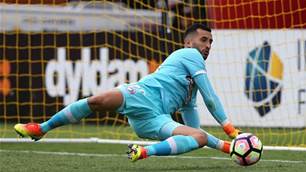Anyone writing off Phoenix's 2012/13 A-League campaign needs to take a deep breath.
First things first. Don’t panic. It’s January, for goodness sake.
As with every other A-League season the playoff participants won’t be confirmed until the last few games of the regular season. The fans of every single club still believe their team will be involved beyond March. And based on points, that optimism is justifiable.
We know the Mariners, Adelaide and Victory will be there and, on recent form, you can add Western Sydney to that list. But with just five points separating the other six sides, and 36 points still to play for, no-one is out of contention, and probably won’t be until about round 25 at the earliest. Any claims that the Phoenix season is dead and buried are extremely premature.
Phoenix doomsayers point to one win in the past six games and wail and gnash their teeth. But history tells us Phoenix suffer slumps every season. Last season, they won just one of their first seven games. The season before they had a similar one-win-in-seven patch in October/November. And in 2009/10 they won just once in their first 10 matches. In all three seasons, the playoffs were achieved.
It’s more useful to examine the factors behind the recent poor results.
The most widely publicised issue has been the desire of the owners to play a more attacking brand of football. Many assume this is against the will of coach Ricki Herbert. Actually, it was a mutual decision between the owners, the board and the coaching staff and one Herbert completely bought into. As sometimes happens with co-owner Gareth Morgan, his forthright public statements were misconstrued by many as an ultimatum to Herbert that he must depart from his modus operandi or risk the sack.
You have to assume Herbert’s keen to play a more attacking style of football. What coach wouldn’t want to see his side tearing apart opposition defences and banging in goals by the hatful? But just as a poker player can only play the hand he’s dealt, Herbert can only select the players on his roster. Vince Lia is not Thomas Broich. Tony Lochhead is not Adama Traore. Alex Smith is not Marcelo Carrusca. And they never will be. They bring their own strengths to the greater whole of Wellington Phoenix FC, and to expect them to become different players overnight is ludicrous.
But attempts at a new, attacking style are evident. When Manny Muscat was suspended, Alex Smith could have replaced him against Victory in a like-for-like swap. Instead, Herbert plumped for Benjamin Totori, a man hardly synonymous with defensive steel. His XI included Totori, Louis Fenton, Stein Huysegems, Jeremy Brockie and Dani Sanchez – the most attacking side he could possibly name from the players at his disposal.
The first 40 minutes against Melbourne Victory were among the best Phoenix have played in recent weeks. They looked relatively untroubled defensively and showed good endeavour on attack. Sanchez directed play from a midfield fulcrum. Totori was energetic. Fenton continued his impressive debut season. They were the better side until they conceded.
But if Marcos Flores’s opener was a blow to Phoenix, Marco Rojas’s goal shortly after half-time knocked the stuffing from them, and this raises a concern. Something which has become apparent – especially in away games – is a seeming lack of player belief in the ability to find a way back into matches from losing positions. For the second time in two matches, Phoenix looked as though they didn’t truly believe they could get back into the game. The same thing happened against Brisbane on New Year’s Day; when Ben Halloran put Roar 2-1 up, followed shortly afterwards by Tyler Boyd’s red card, Phoenix confidence seemed to evaporate.
Furthermore, the away-day blues have afflicted Phoenix again in 2012/13. A recipe for improvement appeared to have been found last season when four wins were earned on the road – more than any other season – including three on the bounce. But this campaign has seen a return to the bad old days – just one win and five points from eight games in Australia. That wouldn’t matter quite so much if Westpac Stadium was an impenetrable fortress, but visiting sides have picked up points in more than half of Phoenix’s home matches in 2012/13.
Every A-League side – with the apparent exception of the Mariners – goes through peaks and troughs. Heart were bereft of attacking ideas on their most recent trip to Wellington, but have won both games since in impressive style. Western Sydney looked extremely listless when they visited Wellington on a blustery afternoon early last month, going down 1-0 to a wind-assisted Jeremy Brockie speculator. But they won four and drew one of their next five matches to leap into the top four.
Phoenix need to start their own revival, and soon. What the recent run of poor results has done is make the remainder of January’s matches absolutely crucial. Phoenix host Western Sydney and Newcastle either side of a visit to Sydney FC. These are the sides Phoenix must be looking to take points from – preferably all three – if they’re to put themselves back into the playoff picture.
Paul Ifill still has an important part to play in Phoenix’s season. He was oddly out-of-sorts for large parts of the first dozen games of the campaign and his recent ankle operation may give a clue as to why. When he does return, Ifill simply must produce what he has in the past three seasons – X-factor performances which carry his side to victory.
Obituaries have been impulsively penned for Phoenix in recent weeks. While the results have been disappointing, the lessons of history need to be remembered. Phoenix can still – and may well – make the top six. In order to do so, they need to find a way of meshing the brave new world of attacking flair with their traditional stout defence and string together some results in the next handful of games. If they’re still ninth in a month from now, it might be time to worry.
Until then, keep calm and carry on. I’d imagine that’s what the team will be doing.
Related Articles

Socceroo-in-waiting seals Championship deal

Fringe Socceroo swerves A-League to remain in Europe after Fulham exit













